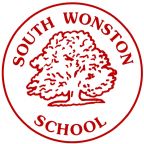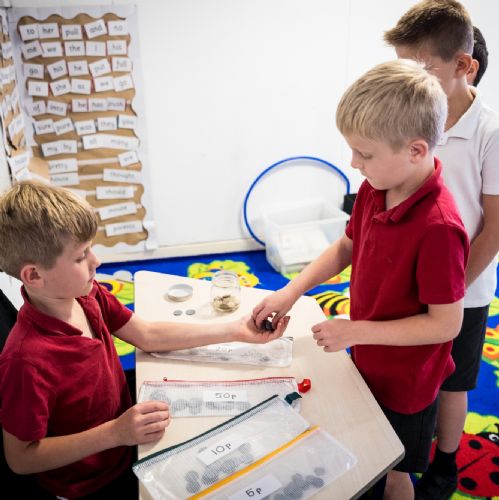Maths
What does Maths look like at South Wonston?
Intent: Why do we teach maths?
The intent of South Wonston Primary School’s Maths curriculum is to provide the children with a high quality, progressive curriculum which enables them to become fluent in their mathematical thinking and recall, to reason about maths articulately and to confidently solve a range of mathematical problems. This will enable them to make sense of the world around them and to recognise that maths is essential to everyday life.
At South Wonston, all of our children are mathematicians! We want children to be inquisitive about the subject, to appreciate the power of maths, to enjoy learning maths, to become more resilient and to experience ‘wow’ moments in their learning through determination, perseverance and hard work. Children should view maths as an interconnected subject so that they are able to use and apply their existing knowledge to new situations, moving confidently and fluently between different representations of mathematical ideas as curious mathematicians.
Children are encouraged to view making mistakes as a fundamental part of the learning process and we enable children to actively check their own work to spot errors and ask questions to clarify their understanding. Identifying and resolving any misconceptions is key to moving children on with their understanding. We strive to develop the children’s resilience to overcome problems and so they can tackle mathematical challenges. Our maths curriculum involves active, practical, hands on experiences that encourage deep thinking and problem solving, allowing children to make connections in their learning and to apply their skills in different contexts.
In line with the National Curriculum, we aim for all pupils to:
• become fluent in the fundamentals of mathematics so that they develop conceptual understanding and the ability to recall and apply knowledge rapidly and accurately.
• be able to solve problems by applying their mathematics to a variety of problems with increasing sophistication, including in unfamiliar contexts and to real-life scenarios
• reason mathematically by following a line of enquiry and develop and present their ideas using mathematical language.
Additionally, we want our children to have an appreciation of number and number operations, which enables mental calculations and written procedures to be performed efficiently, fluently, and accurately to be successful mathematicians.
Our curriculum is frequently reviewed to ensure that is it current and effective and teachers are supported and aided in their teaching of mathematics by appropriate continuing professional development through external and internal training, online training, monitoring, coaching and support from Solent Maths Hub.
We aim to give every child the core mathematical skills and knowledge needed and the confidence to use them. We want children to value maths as not only a subject to learn at school but as a life-long skill. We hope to inspire as many children as possible to develop a love and enthusiasm about the subject, so that they recognise its value - both in everyday life and in the wide range of future careers in science, technology and engineering that maths opens up for them.
Implementation:
At South Wonston Primary School, our maths curriculum and daily maths lessons are based on the principles of maths mastery, which aims for all children to develop a deep understanding of maths, rather than just memorising procedures without understanding the reasons behind them. To enable children to develop mastery before moving onto the next stage of learning, our maths curriculum is built on a clear progression of skills and knowledge, built on year by year and sequenced appropriately. At South Wonston Primary School, we follow the National Curriculum, using the White Rose Schemes of Work* and their Small Steps as a framework for planning a series of interconnected lessons, adapted as necessary to meet the needs of our children.
*White Rose long term overview (updated 2023): https://assets.whiteroseeducation.com/new-schemes/Autumn%20key%20changes%20document.pdf
Teachers adapt the learning for individuals through support and challenge within lessons and in their planning, ensuring children are secure in their learning before moving on. Using this mastery model, the vast majority children learn and move through the maths curriculum at broadly the same pace. Some children with significant learning difficulties follow a curriculum which is designed to meet their specific needs, but this still follows the same principles of mastery. Some children may need additional maths interventions; we aim for children to keep up rather than have to catch up later on. We achieve this through pre-teaching and small group support, in addition to differentiated task design within lessons.
At South Wonston Primary School, we focus not only on teaching mathematical methods but also on the mathematical vocabulary and the language needed to explain their reasoning. Key mathematical vocabulary for the current topic is displayed on each classroom’s Maths Working Wall, to be referred to during lessons. Children are then taught to apply this vocabulary to explain their thinking, using stem sentences as a framework to hang their explanations on.
Securing a deep understanding of mathematical concepts is an essential element of our curriculum. We use the Concrete, Pictorial, Abstract approach (CPA) throughout the school. Children are encouraged to actively select and use a range of practical apparatus to support their thinking about maths. In addition, they become familiar with different pictorial representations of concepts, to help them secure their understanding, before eventually moving onto more formal, abstract representations. Being given opportunities to make connections between concepts is also a key feature of our maths curriculum. For example, children not only learn their times tables facts, but they will learn the relationship with related division facts. In KS2 the children engage in regular low stakes testing through Times Tables Rock Stars to practise fluent recall of all times tables and division facts up to 12 x 12.
Our maths curriculum builds on prior learning, teaching children to use what they already know to find out what they don’t know. Mathematical fluency is key to children progressing through the curriculum so children practise fluency skills every day across all year groups, in addition to their daily maths lesson. In EYFS and KS1, fluency practice follows a programme called Mastering Number at KS1. As the children progress through the school, they continue to practise their fluency skills using a programme called Number Sense Maths, consolidating instant recall of addition and subtraction facts before focusing on multiplication and division. Both Number Sense and Mastering Number focus on securing a deep sense of number relationships and concepts.
All programmes used in the school are very well researched educational strategies founded by the NCETM (National Centre for Excellence in the Teaching of Mathematics). Links to programmes we use can be found below:
https://www.ncetm.org.uk/maths-hubs-projects/mastering-number-at-reception-and-ks1/
We recognise the importance of taking a consistent whole school approach to the teaching of mathematics in order to close any gaps and to target the highest possible number of children attaining the expected standard or higher by the end of KS2. In EYFS and Year 1/2, mathematics is part of the daily learning tasks and is taught through Discovery Time or outdoor learning with a mix of adult-led and child-led activities. We plan a wide range of practical, hands- on tasks, using concrete resources, pictures and images to help children understand key concepts and help them to tackle more abstract maths.
In Key Stage 2 (Years 3- 6) children are taught mathematics for approximately 1 hour daily, with additional lessons for Maths Skills, including Number Sense Maths and arithmetic practice. Children are taught in maths groups, according to their starting point. Support is determined during each lesson to ensure secure understanding based on the needs of the child and through regular Assessment for Learning.
Impact: How do we assess in maths?
Formative assessment of children’s progress in maths takes place daily as Assessment for Learning, whereby the teacher continually adjusts learning through support and extension. A summative assessment judgement is made against national expectations in maths each term in Years 1 to 6. In KS1 this is done through teacher assessment. In KS2 children are assessed through both teacher assessment and standardised tests, which allow teachers to complete a question-by-question analysis of children’s answers. In Year 6, children are assessed using past SAT papers and teachers use gap analysis to target any gaps in knowledge and understanding.
Statutory assessments in maths
In Year 4, children complete the national multiplication tables check (MTC) and in Year 6, children complete three maths papers as part of their end of KS2 two Standardised Assessment Tests (SATs).
Monitoring of the teaching and learning of maths takes the form of learning walks and book looks, as well as conversations with teachers, pupil conferencing, and pupil progress meetings. Impact is also measured through end of key stage assessments in EYFS, Year 2 and Year 6 and end of year data collection in all other year groups. Children who are not on track are closely monitored and provided with small group interventions to address gaps in their learning.


.jpg)
